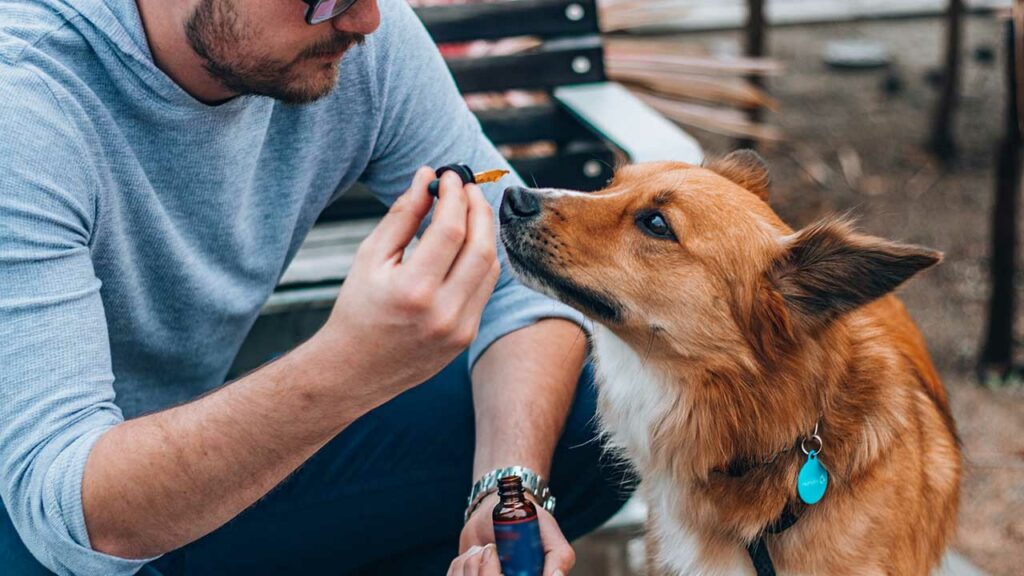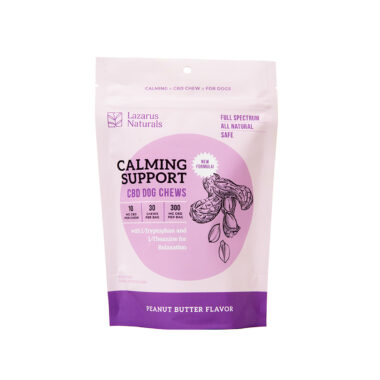Signs Your Dog is Experiencing Discomfort and What to Do About It?
Written by
Michael Levin
Medically reviewed by
Erica Irish
Summarize

Dogs, like humans, can experience discomfort. Since they cannot tell you what is bothering them, it is up to you to recognize the signs of this condition in dogs. Studies have found that dogs have a similar endocannabinoid system compared to humans. The main difference is the location of the CB1 receptors in dogs. Dogs have a higher concentration of CB1 receptors in the cerebellum, medulla oblongata and brain stem. Since THC mostly activates CB1, it is important to avoid CBD products that have any significant amount of THC. This explains why dogs are overly sensitive to THC, but experience benefits from CBD. Adding CBD oil to your treatment plan may improve the quality of life for your dog and you.
The goal is to maintain a balance of CB1 and CB2 activation. If one is to be more impacted, it should be CB2, influencing the selection of the best CBD oil for dogs.

TL;DR (Too Long; Didn’t Read):
Dogs express discomfort in a variety of ways. Symptoms include excessive drooling, panting, difficulty moving, barking and trembling. The dog may have fearfulness and other common issues. You can take many steps to address your dog’s specific issues, including giving your dog CBD treats or oil, which early research and strong anecdotal evidence prove is effective.
Table of Contents
Signs Your Dog is Experiencing Discomfort
The American Kennel Club names the various ways your dog may feel discomfort. Since dogs cannot tell you their feelings, you must interpret body language. The signs of discomfort in dogs include the following.
- Agitation
- Trembling
- Vocalization
- Restlessness
- Panting
- Reduced appetite
- Increased heart rate
- Unwilling to move

According to veterinarians, some other symptoms include an arched back, twitching muscles and hanging the head. A normally mild-mannered dog may get aggressive or do excessive licking. They limp, walk slower than normal and show reluctance to make specific movements like walking up stairs. The dog may have difficulty lying down, getting up off the floor or jumping on its favorite chair.
Signs Your Dog is Experiencing Tension and Fear
People with dogs afraid of fireworks or that experience canine separation quickly get familiar with signs of fear. It is the reaction to feeling threatened or fearful or experiencing uncertainty. Feeling threatened or scared is a response to a direct threat. In separation fear, the dog reacts fearfully to being left alone or when someone your dog is attached to leaves.
The signs of tension in dogs are numerous. One study found 54 different signs indicating it. Some of the most common signs include the following.
- Destroying objects like furniture or rugs
- Whining or barking
- Howling
- Growling
- Constant pacing
- Excessive shedding
- Urinating unexpectedly in a situation like meeting a new dog
- Potty accidents
- Avoids interaction or shows disinterest
- Hides in some manner
Do dogs drool when nervous? The answer is “yes.” Drooling is usually accompanied by other symptoms, like whale eye, panting and rapid blinking. Some dogs naturally drool regularly, so it is when drooling is more excessive than normal that indicates the dog may be nervous.
The American Kennel Club says that watching body language is important. Such dogs may show whale eyes, revealing the whites of their eyes. They may have a tucked tail or ears and do much lip-licking and panting. Excessive yawning in dogs is another tension symptom. A severe sign is when the dog freezes, which means the animal cannot cope. This is a scenario that can easily lead to biting.
What To Do When Your Dog Experience Discomfort?
It would be best to talk to your veterinarian about your pet’s behavior or signs that the dog feels discomfort. Your pet’s condition may be due to a severe medical issue, but it often results from a condition that develops with normal aging. You need to pinpoint and address common triggers in cases of discomfort. Following are some tips on responding to signs your dog is experiencing tension, and the veterinarian has ruled out a serious health issue.

Calm and Relax
For promotions calm and relax, you can take the following steps.
- Exercise your dog daily because it can relieve tension and fearfulness, according to a study at the University of Helsinki.
- Provide a safe spot for your dog where your dog can relax or hide when anxious.
- Limit or avoid the situations you know cause tension.
- Give your dog a chew toy because chewing is calming.
- Play calming music.
- Show your dog affection.
- Giving your dog CBD treats for pets or oil can help reduce behaviors like excessive scratching.
The research on CBD for dogs is nascent, but many people say it works. A study, published in Frontiers in Veterinary Science shows that CBD positively influences measures of discomfort in dogs caused by travel or being left alone.
Discomfort Relief
To help relievea soft tissue sprains or injuries, the following strategies have proven helpful.
- Make it easier for your dog to reach favorite spots, like using portable steps so the dog can reach the bed.
- With a veterinarian’s approval, give your dog an NSAID that the FDA approves for dogs to control discomfort.
For separation fear, leave for a short time and treat your dog upon returning. Over time, increase the time you are gone, praising the dog each time you return and rewarding your pet for good behavior.
Summary
Nervous and overwhelmed dogs will let you know they are experiencing emotional or physical discomfort. The challenge for pet owners is recognizing the signs of discomfort in dogs. The signs of discomfort in dogs may be more evident because the dog will limp, and be unable to move in specific ways. The good news is that you can learn how to help a dog find relief. Treating discomfort requires a combination of approaches, including giving the dog CBD products formulated for pets with a veterinarian’s guidance.
Sources
- https://www.ncbi.nlm.nih.gov/pmc/articles/PMC6770351/
- https://www.akc.org/expert-advice/health/signs-that-your-dog-is-in-discomfort/
- https://www.petmd.com/dog/care/evr_dg_managing_dogs
- https://www.ncbi.nlm.nih.gov/pmc/articles/PMC8479053/
- https://www.frontiersin.org/articles/10.3389/fvets.2021.645667/full
- https://www.frontiersin.org/articles/10.3389/fvets.2023.1112604/full
- https://www.sciencedaily.com/releases/2020/08/200820102409.htm
- https://pubmed.ncbi.nlm.nih.gov/34605042/
- https://www.ncbi.nlm.nih.gov/pmc/articles/PMC8473042/
- https://www.fda.gov/animal-veterinary/animal-health-literacy/get-facts-about-relievers-pets#Dogs
Share this post






0